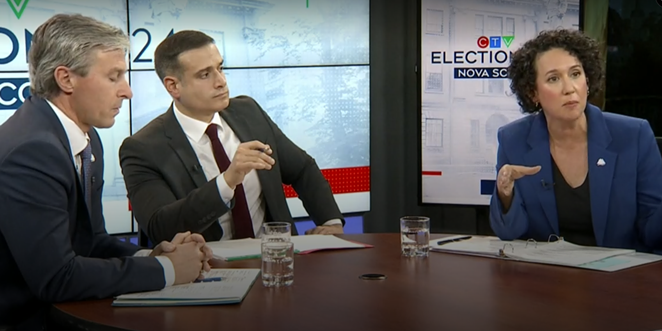Birth control screwup and a weird pizza analogy: Takeaways from the second leaders debate

Premier Tim Houston faced criticism from his fellow party leaders during CTV Atlantic’s provincial leaders roundtable, but he remained steadfast in his belief that his plan for Nova Scotia is working. The messy debate saw Houston and Liberal leader Zach Churchill clashing throughout the evening, while NSNDP leader Claudia Chender focused on policy issues.
Chender made a strong point when she criticized Houston for not accepting the federal government’s offer to make birth control free under Bill C-64, the pharmacare act. This bill, passed in October, allows for free diabetes medication and contraceptives for provinces that negotiate deals with the federal government, saving individuals and families significant amounts of money on their medication.
Houston defended his decision to not immediately accept the federal offer, stating that he wanted to negotiate for a better deal. However, Chender’s pointed critique highlighted the fact that Nova Scotians are still paying for medication that has become free in other provinces.
Houston also faced criticism for his stance on rent control, with Chender and Churchill both pushing for measures to address skyrocketing rent and rent cap avoidance. Houston argued that further rent control measures would deter builders from constructing more homes, but his response did little to address the concerns of tenants facing eviction.
Churchill, on the other hand, made a cringeworthy analogy regarding ambulance wait times in the province, downplaying the severity of the issue. Despite this misstep, Churchill’s performance was solid overall, with repeated talking points on reducing HST and criticizing Houston for overspending.
Chender emerged as a strong voice of reason during the debate, with accurate and hard-hitting critiques of the PC Party and Liberal platforms. She called out Houston for not taking the government’s deal on birth control and also highlighted the Liberal party’s role in creating the fixed-term lease loophole.
Polling data suggests that Houston is currently leading in popularity among Nova Scotian voters, with 44% in his favor. The election, called suddenly by Houston, is set to take place on Tuesday, Nov 26, with the competition shaping up to be fairly one-sided. However, the election remains important in determining who will serve as the official opposition, making the ability to deliver accurate and pointed criticism crucial for the Liberals and NDP.
Overall, the provincial leaders roundtable highlighted the key issues facing Nova Scotia and the different approaches each party leader takes in addressing them. As the election approaches, voters will have to consider which leader and party offers the best plan for the province’s future.



